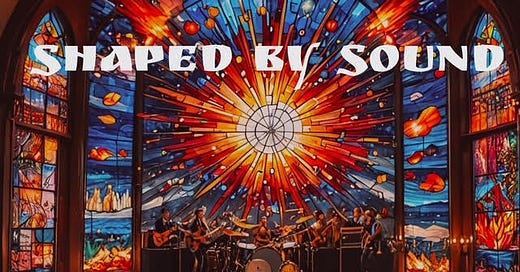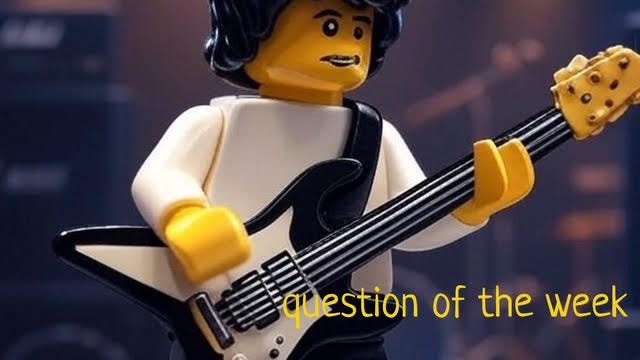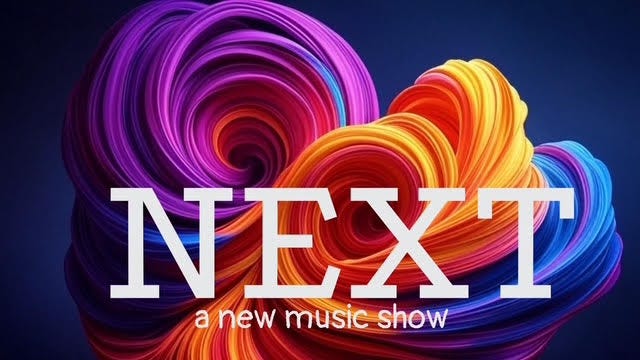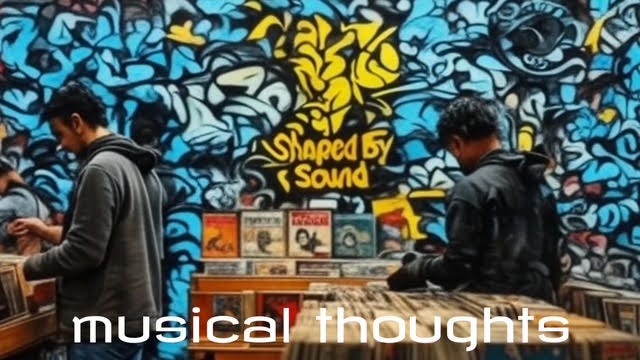Songs Based On Books SbS 06.26.25 Newsletter 32
The Beatles. Radiohead. The Alarm. The Cure. Rush. Nirvana. Alan Parsons Project. Jefferson Airplane. Metallica. The Police. Next: My weekly new music radio show. Week 999 Our Notable Songs of June.
When Books Soundtrack Your Trip (Literally)
Great literature has always had a way of crawling under your skin—but what happens when it climbs into the studio instead? From the psychedelic rabbit holes of Jefferson Airplane to the dystopian thrash of Metallica, some of music’s most iconic tracks owe their DNA to the pages of novels, poems, and plays. These aren’t just loose inspirations; they’re full-blown collaborations across centuries, where authors’ words mutate into riffs, lyrics, and sonic worlds.
Think of it as literature’s revenge: Hemingway’s stoicism becomes a punk anthem. Poe’s nightmares twist into prog-rock suites. And a depressed robot from Hitchhiker’s Guide fuels Radiohead’s existential rage. Sometimes the connection is shouted - sometimes it’s whispered but the result is always the same—a song that demands you flip back to chapter one and make copious notes in the margin.
So grab your headphones and your highlighter. We’re diving into songs that double as book reports—no SparkNotes required.
Turn on, tune in, drop out… and bookmark this page.
Ever loved a book so much you turned it into a banger? The Beatles did. "Tomorrow Never Knows" isn’t just Lennon’s mind melting over a killer drum beat—it’s basically a psychedelic cliff notes version of Timothy Leary’s "The Psychedelic Experience" (which, fun fact, is just the Tibetan Book of the Dead for people who owned lava lamps).
The lyrics? Straight-up borrowed from Leary’s "Whenever in doubt, turn off your mind, relax, float downstream." Because why write your own spiritual advice when you can just drop it over a sitar noise that sounds like a spaceship crashing into a tamboura?
The result? A song that sounds like enlightenment feels—if enlightenment also involved tape loops and Paul McCartney screaming into a bucket.
"Paranoid Android" by Radiohead – A Depressed Robot, a Bar Fight, and the Sound of Existential Dread
Thom Yorke once called "Paranoid Android" the musical equivalent of being "drunk at a party where no one likes you"—which makes perfect sense when you learn it was born from equal parts Douglas Adams nerdery and a genuinely unhinged L.A. bar encounter.
The title is a direct nod to Marvin. The Hitchhiker’s Guide to the Galaxy's clinically depressed robot ("Brain the size of a planet, and they ask me to open doors..."). But the song’s visceral rage? That came from Yorke witnessing a woman in a Los Angeles bar completely lose it after someone splashed her with a drink. One minute, everything’s normal—the next, she’s screaming like the world’s ending. (Now that’s a Mood)
That surreal meltdown bled into lyrics like "kicking, squealing Gucci little piggy," while Marvin’s cosmic despair shaped the song’s structure—a sprawling, three-act odyssey that swings from creeping paranoia to full-on sonic collapse. It’s prog-rock meets panic attack, with a side of "why is life like this?"
So really - "Paranoid Android" is the perfect Radiohead song: equal parts high-concept sci-fi and real-world chaos. All wrapped up in a melody that sounds like the universe sighing into a void (and The Bends is still my favorite).
"Here I am, brain the size of a planet, and Thom Yorke just turned my misery into a banger." —Marvin, somewhere, resentfully.
"The Stand" by The Alarm – A Stephen King Epic Turned Punk-Rock Anthem
When The Alarm unleashed "The Stand" - they didn’t just write a song—they bottled Stephen King’s apocalyptic masterpiece into three and a half minutes of fist-pumping rebellion (or add a minute for the Long Version). This wasn’t subtle inspiration - this was a full-throttle tribute to King’s saga of good vs. evil after a plague obliterates civilization.
The proof’s in the lyrics: "I met the walking dude, religious, with his worn-out cowboy boots" is a dead ringer for Randall Flagg. King’s demonic villain stalking the ruins of America. And when they sneer "Hey Trashcan, where you going boy?” Any Stand fan knows that’s trashcan man—the unhinged pyromaniac who plays a terrifying role in the novel’s climax.
They captured the book’s soul. The song’s driving rhythm and shouted chorus ("Come on down and meet your maker!") mirror the novel’s epic showdown, where survivors must stand for something before the world burns. It’s punk energy meets King’s sprawling dystopia, like someone set The Stand to a Clash riff and cranked it to 11.
"Killing an Arab" by The Cure – A Misunderstood Ode to Camus' The Stranger.
Here’s to misunderstood literary references and teenage poetry gone global
Robert Smith admitted in a 2001 Chart Attack interview: If there's one thing I would change, it's the title. I wrote it when I was still in school and had no idea anyone would ever listen to it other than my immediate school friends. One of the themes of the song is that everyone's existence is pretty much the same. Everyone lives, everyone dies, our existences are equal. It's as far from a racist song as you can write. It seems though that no one can get past the title—and that's incredibly frustrating (and from what I've heard I can't say that word - I can write it though). We are dolts.
What began as Smith's brooding teenage attempt to channel Albert Camus' The Stranger—complete with jangly guitars mimicking the novel's scorching Algerian sun—became one of rock's most misinterpreted songs. The lyrics clinically recount Meursault's senseless beach shooting: "Standing on the beach / With a gun in my hand / Staring at the sea / Staring at the sand." No drama, no remorse—just existential detachment set to post-punk.
The controversy raged while the point was missed entirely. The Cure even performed it as "Killing Another" to avoid backlash, but the damage was done. Smith wasn't glorifying violence. He was distilling Camus' absurdist philosophy into three minutes of bleak pop—the terrifying idea that in an indifferent universe, even murder carries no inherent meaning.
"Scentless Apprentice" by Nirvana – A Grunge Ode to Süskind's Perfume
Starts with those drums! Bonham-esque. Kurt Cobain howls! (understatement). The “In Utero” track isn’t just loosely inspired by the book. It's a full-throttle, distortion-soaked retelling of protagonist Jean-Baptiste Grenouille’s grotesque journey—a man born without a scent who becomes obsessed with capturing others’ essences, even through murder.
The lyrics mirror the character’s freakish existence: "You can’t fire me because I quit / Throw me in the fire and I won’t throw a fit". Cobain channels Grenouille’s eerie detachment from humanity. The song’s structure—a lumbering, bass-heavy assault that suddenly explodes into chaos—mirrors the novel’s descent from eerie obsession to violent madness.
What resonated most with Cobain? The horror of being fundamentally other. Or maybe feelings of being inhumanly disconnected. Nirvana’s crushing instrumentation makes it viscerally tangible. A twisted outcast learning to navigate a world that revolts him.
So while Süskind’s novel ends with Grenouille literally devoured by a crowd, Nirvana’s tribute lingers as something equally primal—a three-minute scream into the void about being born wrong.
"One" by Metallica – A Metal Anthem Born from War’s Worst Nightmare
When Metallica unleashed "One" in 1989, they didn’t just write a song—they weaponized Dalton Trumbo’s harrowing 1939 anti-war novel “Johnny Got His Gun” into a metal opus. The result? A chilling first-person account of a WWI soldier blown apart by artillery. Left limbless. Faceless. And trapped in his own living corpse—a fate worse than death set to one of metal’s most iconic riffs.
The parallels are brutal: Trumbo’s protagonist Joe Bonham (a conscious, unresponsive "piece of meat" in a hospital bed) becomes Metallica’s narrator screaming "Darkness! Imprisoning me!" The song’s structure mirrors Joe’s unraveling sanity—clean, melodic verses (his memories) erupt into thrashing chaos (his reality). Even the lyrics "Hold my breath as I wish for death" could be ripped straight from the novel’s internal monologue.
But Metallica didn’t stop there. Their music video spliced footage from the 1971 film adaptation—close-ups of a bandaged, twitching body intercut with the band’s ferocious performance. The effect was visceral: war wasn’t heroic, it was a meat grinder that turned men into things.
James Hetfield called it: the most depressing song we’ve ever written. "One" forces you to stare into the abyss Trumbo exposed. 7 minutes and 44 seconds of pure dread.
"White Rabbit" by Jefferson Airplane – A Psychedelic Wonderland Anthem
When Grace Slick penned "White Rabbit" - she didn’t just borrow from “Alice’s Adventures in Wonderland”—she weaponized Lewis Carroll’s absurdist fairy tale into a hypnotic, drug-fueled manifesto. Over a creeping, Ravel-Boléro-inspired bassline - Slick’s lyrics name-drop the Caterpillar, the White Knight, and the Red Queen. She’s turning Carroll’s Victorian whimsy into a sly endorsement of mind expansion.
The genius lies in the subtext: Carroll’s "Eat Me" and "Drink Me" become Slick’s "Feed your head". And Alice’s disorienting size-shifts mirror the psychedelic experience ("One pill makes you larger / And one pill makes you small"). Even the song’s structure—a slow-building crescendo that erupts into chaos—mirrors Alice’s fall down the rabbit hole.
By the time Marty Balin’s guitar snarls to life…"White Rabbit" isn’t just a song—it’s a dare. Slick later admitted she wrote it to "explain reality to adults using a children’s story.” The result became the ultimate counterculture lullaby: equal parts nursery rhyme and acid trip.
The Police’s - Don’t Stand So Close to Me: A Dance with “Lolita”
Sting—a former English teacher—drew direct inspiration from Vladimir Nabokov’s notorious novel “Lolita” - crafting a song that blurred the lines between literary allusion and uncomfortable reality. The track’s lyrics ("Young teacher, the subject / Of schoolgirl fantasy") mirror the taboo relationship between Nabokov’s Humbert Humbert and his underage obsession, Lolita. The nervous, reggae-infused groove underscores the tension of forbidden desire.
The song’s genius (and controversy) lies in its duality: Is it a condemnation of predatory behavior, or does its catchy chorus accidentally glamorize it? A “Lolita” redux with a new wave soundtrack.
"Don’t Stand So Close to Me" remains a masterclass in lyrical unease—proof that pop music can flirt with darkness without absolving it.
The Police - turning Nabokov’s sin into a sinister earworm.
The 86 version. Which do like better?
“Tales of Mystery and Imagination" – Alan Parsons' Haunting Ode to Poe
Before The Alan Parsons Project became synonymous with lush, story-driven prog-rock, Alan Parsons was already a legend behind the boards—having engineered “Abbey Road” with The Beatles and shaped “The Dark Side of the Moon” for Pink Floyd. He stepped into the spotlight with “Tales of Mystery and Imagination.”
The concept? A full-album dive into Edgar Allan Poe’s macabre tales, from "The Raven" (complete with Orson Welles’ booming narration) to "The Tell-Tale Heart" (reimagined with paranoid synths and heartbeat percussion). Parsons treated Poe’s stories like sonic experiments, blending orchestral grandeur with eerie soundscapes—proof that his engineering genius could also fuel artistic vision.
Quoth the engineer: Nevermore.
"Xanadu" by Rush – A Prog-Rock Epic Born from Coleridge’s Opium Dream
When Neil Peart set out to write "Xanadu" for Rush’s 1977 album “A Farewell to Kings” - he originally aimed for a “Citizen Kane” tribute—until Samuel Taylor Coleridge’s hallucinatory 1816 poem "Kubla Khan" hijacked the narrative. The result? An 11-minute synth-and-guitar odyssey that transforms Coleridge’s fragmented vision into a full-blown mythos of eternal longing.
The parallels are deliberate: Coleridge’s "stately pleasure-dome" becomes Rush’s "sweet mountain wine" paradise. The poem’s "sunny spots of greenery" morph into Peart’s "gardens bright with sinuous rills." The song’s structure mirrors the poem’s dream logic—shifting from Alex Lifeson’s chiming 12-string intro to Geddy Lee’s Moog-driven frenzy, as if chasing Coleridge’s opium-addled inspiration.
Coleridge’s poem famously breaks off mid-creation ("Could I revive within me..."), Peart’s lyrics push further: his narrator finds Xanadu, only to realize immortality is a curse. The song’s climax—a swirling cacophony of Lee’s bass and Peart’s gong strikes.
And so ends our literary musical adventure. Thanks for reading/listening along.
Oh and “I Am the Walrus" by The Beatles kinda covered that one last week.
🎵 NEXT Rewind: June 2025’s Notable Tracks 🎵
From punk to folk, no genre was safe. Tears to thrills in 17 tracks. These aren’t just songs—they’re stories with staying power.
June 2025 was a month where music didn’t just play—it pulsed. From raw indie anthems to soul-stirring ballads, these were the songs that defined our airwaves. Consider this your time capsule—a reminder of the tracks that made us crank the volume, hit repeat, and fall in love with sound all over again.
Our notable songs of June 2025 🔥
Car Seat Headrest – "The Catastrophe (Good Luck With That Man). A song for overthinkers and under-sleepers - with lyrics that cut like a late-night text you shouldn’t send.
Foxwarren – Listen2Me. Andy Shauf’s side project delivered a slow-burning, jazz-kissed groove - perfect for staring at ceiling fans and wondering where the time went.
Ax And The Hatchetmen (feat. Albert Hammond Jr.) – Blurry Lights. The Strokes’ guitarist lent his magic to this jangly, neon-lit banger—a love letter to messy nights and blurry mornings.
Muck And The Mires – Carefree. Two minutes of garage-rock adrenaline that smells like leather jackets and spilled beer. Play it loud and pretend you’re in a 1966 dive bar.
Wunderhorse – The Rope. Rock’s not dead. A brooding, bass-heavy storm of regret and resilience.
Beddy Rays – Stay The Same. Australian surf-punk that’s sunburnt and sincere. For when you’re torn between growing up and giving up.
The Beaches – Takes One To Know One. Sass meets shredding in this glam-rock stomper about calling out phonies (and maybe being one yourself).
Sunday (1994) – Still Blue. A shoegaze relic dusted off and shining brighter than ever. Like staring at the ocean through a rain-streaked windshield.
Park National – Old Wounds. Post-punk with a heart of glass. Angular guitars, whispered confessions—this one lingers.
Molly Tuttle – That’s Gonna Leave a Mark. Bluegrass virtuosity meets breakup venom. Her fingers move faster than your ex’s rebound.
Kathleen Edwards – Save Your Soul. Alt-country’s sharpest storyteller returns with a wry, whiskey-soaked hymn for the disillusioned.
Margo Price – Don’t Let The Bastards Get You Down. A middle-finger waltz with honky-tonk horns. Play this when the world feels heavy.
Horsegirl – Information Content. Three teens channeling 90s noise-pop like they invented it. Loud, lo-fi, and so cool.
Wolf Alice – Bloom Baby Bloom. Ellie Rowsell’s voice swings between angelic and feral in this genre-blurring stunner.
Skinny Lister – Song From Yonder. A folk-punk sea shanty for raising pints and burning bridges.
David Byrne (feat. Ghost Train Orchestra) – Everybody Laughs. A surrealist cabaret where Byrne plays ringmaster. Existential dread has never been this danceable.
Porch Light – Fall Back. Indie-folk that feels like a hug from an old friend. For when you need to remember: softness is strength.
🎤 Final Thought: What was YOUR June 2025 anthem? Drop us a line! Or don’t.
Gotta say someone at Adidas is a fan. This video is brilliant. The tambourine as the icebreaker is brilliant. The crowd singing back is brilliant. I don’t care how you feel about Oasis and/or Adidas and/or the collaboration - just watch.
About Bloody Time, Isn’t It? I will say it's a wee bit mad – proper mental, that this is the first official Oasis x Adidas collab. The prodigal parka-wearing, trackie-loving, swagger-dripping union is finally here. If you are in to that sort of thing.
Thank you for reading/listening.
Music is Life. Music is Magic. Live Music Is Good For Your Soul.
And remember if you love someone hug them right now.









Enjoyed that Oasis-Adidas video. I always enjoy the Gallagher music and style.
Thanks for profiling "White Rabbit," a brilliant song inspired by brilliant literature. Some insights on the music I hadn't noticed and appreciated.
I love the topic; and I think it's fun that it allows for bands taking a big swing at something important (and occasionally ending up overly pretentious) and others just having some fun with it.
(And it's possible that songs which reference Tolkien or Moorcock should be considered in their own category).
A few more examples that I enjoy.
The Police "Tea In The Sahara" comes directly from a story told in _The Sheltering Sky_
Sarah Jarosz "Annabelle Lee" superbly adapts a Poe story -- https://www.youtube.com/watch?v=d-dr7CNNvng
Tom Waits "Shiver Me Timbers" references Martin Eden (by Jack London) -- https://www.youtube.com/watch?v=vfLY8NZCQMg
Bruce Springsteen "The Ghost Of Tom Joad" -- https://www.youtube.com/watch?v=qUhtdAOn4k0
The Indigo Girls covering Dire Straits "Romeo and Juliet"
Suzanne Vega "Calypso" tells a story from The Odyssey. I like this recording: https://www.youtube.com/watch?v=286ZSMQLNco